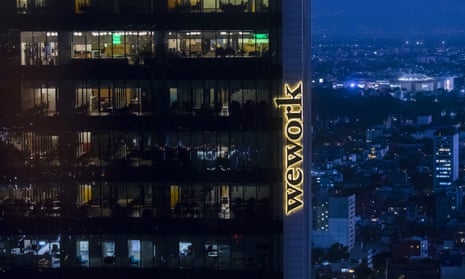WeWork plans to file for bankruptcy as early as next week, a source familiar with the matter said on Tuesday, as the SoftBank Group-backed company struggles with a massive debt pile and hefty losses.
Shares of the flexible workspace provider fell 32% in extended trading after the Wall Street Journal first reported the news. They have fallen roughly 96% this year. The company never seemed to recover from the scandal of its founder’s ouster and the remote work revolution of the pandemic.
New York-based WeWork is considering filing a chapter 11 petition in New Jersey, the WSJ reported, citing people familiar with the matter.
WeWork declined to comment.
Earlier on Tuesday, WeWork said it had entered into an agreement with creditors for temporary postponement of payments for some of its debt, with the grace period nearing an end.
The company had net longterm debt of $2.9bn as of June end and more than $13bn in longterm leases, at a time when rising borrowing costs are hurting the commercial real estate sector.
WeWork’s filing for bankruptcy would mark a stunning reversal of fortune for the company, privately valued at $47bn in 2019. It remained a black spot on the balance sheet of investor SoftBank, which sunk billions into the company.
The company has been in turmoil ever since its plans to go public in 2019 imploded following investors’ skepticism over its business model of taking longterm leases and renting them for the short term, worries over its hefty losses and remote work.
WeWork’s woes did not abate in subsequent years. It finally managed to go public in 2021 at a much-reduced valuation. Its major backer, Japanese conglomerate SoftBank, invested tens of billions to prop up the startup, but the company has continued to lose money.
WeWork raised “substantial doubt” about its ability to continue operations in August, with numerous top executives, including CEO Sandeep Mathrani, departing this year.
